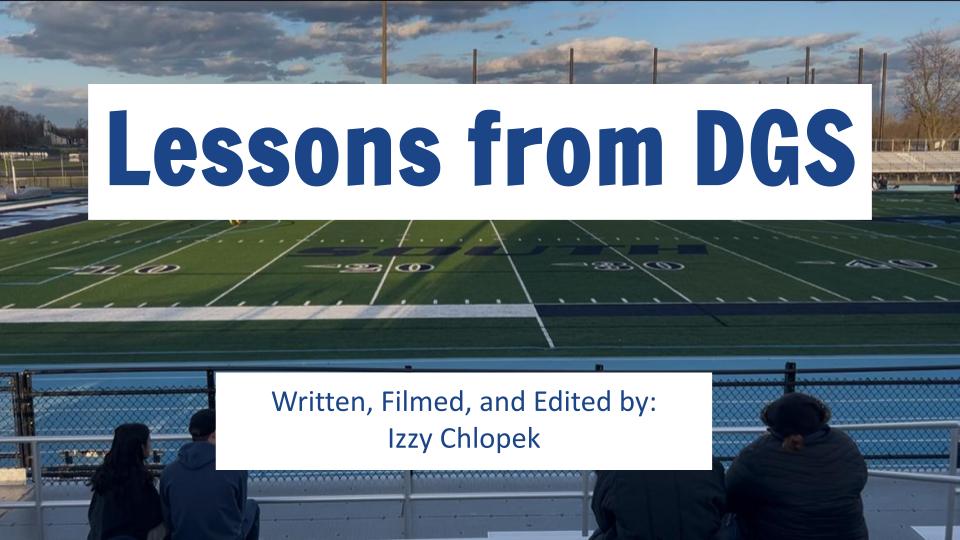The 2025-2026 school year at DGS is set to embrace new course changes, offering students different credit levels and course length changes. In classes such as AP Psychology and Anatomy and Physiology, DGS is working with the AP college board and the College of Dupage to enhance students’ learning environments and criteria.
Starting with the AP Psychology course here at DGS, while in the past the course has been a semester-long class, new changes are being made to ensure teachers have enough time to teach the curriculum. Due to the recent changes in the AP College Board curriculum, it is now fit that AP psychology becomes a full-year course instead of the semester course it has been in years prior. In order to fully prepare students for the AP exam in the spring, the AP psychology teachers need more time to fit all of the curriculum in, while still allowing students to learn and comprehend the material.
AP Psychology teacher Kimberly Pazdan shared insight as to what is going on behind the scenes in the AP Psychology world.
“College Board, in April, came out with new changes to the curriculum, content and skills that are going to be required for students to have in order to be successful in the course. However, we were only able to cover about half of the content. We [District 99] thought these new changes were going to come out the following school year, but they decided to make the changes pretty rapidly. Because of that we were not prepared, and so that’s why we had to keep this a semester course for this school year [2024-2025]. But knowing College Board had made these changes, the district decided that it needs to be moved to a year-long class,” Pazdan said.
Given the fact that DGS had a short period of time to adjust to the change in curriculum, AP Psychology remained a semester-long course for the 2024-2025 school year. With semester-long courses, students are allowed to take the class either first or second semester, which raises the question of what would be more beneficial for students.
“It’s a tiny difference, and it’s always been that way so this has not changed for student’s first semester, but we have a few more days first semester than we do for second semester. We have supplemental materials that we give to both first and second-semester kids. So it’s really not a difference,” Pazdan said.
Junior Jack Melie is currently in the semester class, and he shared his perspective on the course changes.
“While I don’t know what this class looked like before this curriculum change, I’d say that our AP Psych teachers are doing a great job with the adjustment. They constantly provide us with various resources, like vocab charts, and different in-class notes and websites, so we know exactly what they are expecting from us. In my opinion, the class still runs really smoothly and I’ve learned a lot throughout this semester,” Melie said.
AP Psychology isn’t the only DGS course undergoing a change; the science course Anatomy and Physiology is on track to become a weighted course and a possible dual credit course. As for what this changes about the course; the course will be graded on a five-point scale, but not necessarily an honors class. As well, the course has the opportunity to become a dual credit for the College of Dupage.
When talking to Anatomy and Physiology teacher Nadine Kahl, she shared that the course has always been rigorous, thus the move for it to be on a five-point scale adequately describes the nature of the class.
“Anatomy and Physiology historically at DGS has always been a more intensive workload and strives to give students an opportunity to take more advanced course work when it comes to exploring the human body. With recent changes for it to become dual credit, still pending board approval, it would probably be deemed fit for students to get the credit that they deserve for it,” Kahl said.
As for the course load of the class, the material will be adjusted so that it meets the dual credit requirements of the College of Dupage.
Given Anatomy and Physiology’s rigorous course load, the class has always required students who are willing to put in the work and dedication. However, with the new five-point scale and dual credit requirements, Kahl believes that students may be more inclined to take the class.
“It’s a good opportunity and a good choice to take the class now that it’s weighted. I think a lot of students are going to want that added bonus,” Kahl said.
Due to the new weighted aspect of the class, Khal feels that students may be more inclined to take the class because they will gain higher credit for their work.
“I think it’s going to create some opportunities to really push students in new ways, so I’m super excited for it. It will be beneficial for students who are looking to receive college credit at [College of Dupage], and if they are aware or have a good understanding of how credits can be transferred to the schools they would like to go to in the future, then it’s absolutely going to be helpful because they are going to have good foundational knowledge,” Kahl said.
Kahl doesn’t think that the weight change should discourage students from taking the course. She suggests that students talk to their science teachers or counselors about integrating Anatomy and Physiology into their course load.
















